FROM A LAST BATTLE OF FRANCE |
"The MacDonald's Of France" |
A young man from South Uist in the Outer Hebrides played a key role in Charles Edward Stuart's escape following his defeat at Culloden in 1746. Neil MacEachen's part in Bonnie Prince Charlie's dramatic flight to Paris led to him living in exile on handouts from rich Jacobites. But let us follow the islander's story and how his son, Etienne Alexander MacDonald, could have been the Emperor of France. |
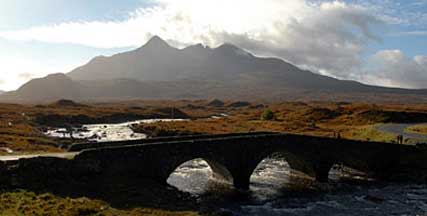 |
It was late April, and the wind which whistled around Nunton House on the island of Benbecula still carried an Arctic chill as the MacDonald chief and some of his closest friends discussed the military catastrophe that had occurred 12 days earlier on the icy fields of Culloden. But even the men of Clanranald could not have predicted the full scale of the avenging forces that would eventually be ranged against them. Their estates would be seized, their language and culture would soon face extinction. As they ate their dinner a hushed message |
| was delivered on the doorstep that would change forever the life of one of the young men at the table. He would not have known it then, but his reaction to message meant that Neil MacEachen, tutor to the Clanranald children and friend of Charles Edward Stuart, would eventually die an exile, in abject poverty in a foreign land. Born in Howbeg, a small village on the west coast of South Uist, Neil was an intelligent, pious young man who felt he had a calling for the priesthood. At the time no one could train to be a priest in Protestant, post-Reformation Scotland so Neil had to go to the Scots College in Paris. He was there at the same time as many prominent Jacobites. Neil never completed his studies and returned to Uist where he tutored the chief's family but this may have been a cover for his activities as a Jacobite spy. It is claimed that he fought in the 1745 rebellion and was present at Culloden but there is no real evidence. However, there is no question about the importance of his role in helping the prince evade capture and eventually escape to France. School history books tell the story of the prince dressing in women's clothes, changing his name to Betty Burke and escaping "across the sea to Skye" with Flora MacDonald. Flora was in the boat but so was her cousin, Neil MacEachen. Fluent in French, English and Gaelic, he had been the prince's constant companion as they hid from the Red Coat soldiers in safe houses and isolated caves around South Uist. |
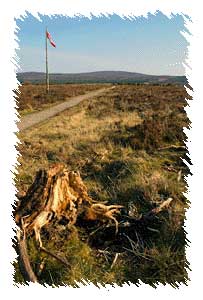 |
Charles Edward Stuart had been on the run for nearly a fortnight when his ship arrived at Rosinish on the east coast of Benbecula. |
The small town had considerable attractions. The cost of living was cheap, the wine was good and the town was home to a small Jacobite community. |
"The family would not have survived without financial support from better off Jacobites." |
Neil MacDonald eventually paid a heavy price for his loyalty to the prince. "Keep it in remembrance of me and my friendship for you." |
| MacDonald then tried to negotiate the best possible terms of abdication with the Allies, and particular with the Czar of Russia. Napoleon was exiled to Elba but escaped and raised an army of loyal veterans. He asked MacDonald to join him but he had sworn allegiance to the restored Monarch, King Louis XVIII and refused. Napoleon's dream of returning to power was eventually broken at Waterloo and he was soon back in exile where he died in 1821. While Napoleon's memory faded away MacDonald prospered. He became a minister in the French government, a Peer of the Realm and was elevated to Arch-Chancellor of the order of the Legion d'Honneur. His statue now stands on the side of the Louvre, his name is inscribed on the Arc de Triomphe and one of the boulevards of Paris was named after him. But the son of South Uist had never forgotten the stories his father had told him as a boy and in 1825 he went on a remarkable pilgrimage back to Howbeg. |
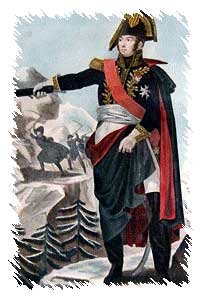 |
| His diary records the purpose of his trip: "29th of June 1825. We are now under sail for the Hebrides. The purpose of my journey is to see the house where my father was born, the cave where he hid with Prince Charles for three weeks, as well as what is left of our family." The newspapers of the time said that 600 people came out to see this rich, powerful French man with the incredible history. The turnout might have been boosted by the barrel of whisky he brought with him. It must have been an emotional experience for the marshal. He writes in his diary, "We are welcomed by a quantity of MacDonalds. I meet an elderly spinster who sheds tears of joy: she is my first cousin." The marshall's diary also observes the poverty of the people who were now living in constant fear of Clearance, by their own landlords, in many cases their own flesh and blood. A progressive landowner in France, MacDonald offers no opinion or explanation. |
Last Battle |
| When MacDonald died in 1840 at the age of 70 he was given a state funeral and buried in the Marshall's Boulevard in Pere Lachaise cemetery in Paris. Soil he had brought from his father's house in South Uist 15 years earlier was buried with him. It was the end of a remarkable story that spanned more than 100 years of Scottish and European history, involved the last battle fought on British soil and the Emperor Napoleon. And it all started in a thatched house near the stunning white beach at Howbeg on the Atlantic coast of South Uist. |
Étienne-Jacques-Joseph-Alexandre MacDonald "(November 17, 1765 – September 7, 1840)" |
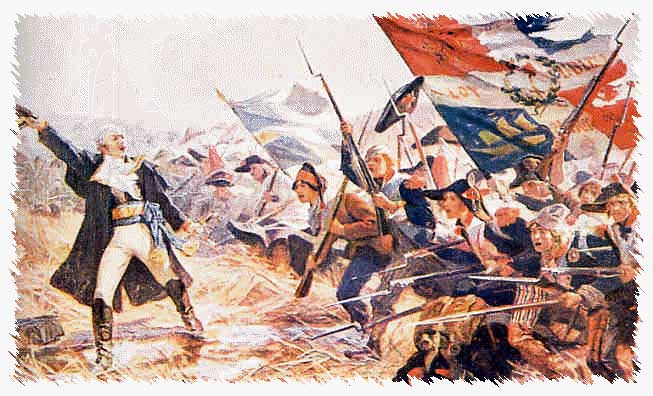 |
Family Background |
| He was born in Sedan, France. His father, Neil MacEachen (later MacDonald) of Howbeg came from an old Jacobite family from the island of South Uist, in the Outer Hebrides of Scotland. He was a close relative of the celebrated Flora Macdonald, who played a key role in ensuring the escape of Prince Charles Edward Stuart after the failure of the 1745' Rising. |
Military Life |
In 1785 Macdonald joined the legion raised to support the revolutionary party in the Netherlands against the Prussians, and after it was disbanded he received a commission in the regiment of Dillon. On the breaking out of the Revolution, the regiment of Dillon remained eminently loyal, with the exception of Macdonald, who was in love with Mlle Jacob, whose father was enthusiastic for the doctrines of the Revolution. Directly after his marriage he was appointed aide-de-camp to General Dumouriez. He distinguished himself at Jemmapes, and was promoted colonel in 1793. He refused to desert to the Austrians with Dumouriez, and as a reward was made general of brigade, and appointed to command the leading brigade in Pichegru's invasion of the Netherlands. His knowledge of the country proved most useful, and he was instrumental in the capture of the Dutch fleet by French hussars. In 1797, having been made general of division, he served first in the army of the Rhine and later in that of Italy. When he reached Italy, the treaty of Campo Formio had been signed, and Bonaparte had returned to France; but, under the direction of Berthier, Macdonald first occupied Rome, of which he was made governor, and then in conjunction with Championnet he defeated General Mack, and revolutionized the kingdom of Naples under the title of the Parthenopaean Republic. When Suvorov invaded northern Italy, and was winning back the conquests of Bonaparte, Macdonald collected all the troops in the peninsula and moved northwards. With only 30,000 men he attacked, at the Trebbia, Suvarov with 50,000, and after three days' fighting, during which he held the Russians at bay and gave time for Moreau to come up, he retired in good order to Genoa. After this gallant behaviour he was made governor of Versailles, and acquiesced, if he did not co-operate, in the events of the 18th Brumaire. In 1800 he received the command of the army in Switzerland which was to maintain the communications between the armies of Germany and of Italy. He carried out his orders to the letter, and at last, in the winter of 1800-1, he was ordered to march over the Splügen Pass. This achievement is fully described by Mathieu Dumas, who was chief of his staff, and is at least as noteworthy as Bonaparte's famous passage of the St Bernard before Marengo, though followed by no such successful battle. On his return to Paris Macdonald married the widow of General Joubert, and was appointed French plenipotentiary in Denmark. Returning in 1805 he associated himself with Moreau and incurred the dislike of Napoleon, who did not include him in his first creation of marshals. |
Under Napoleon |
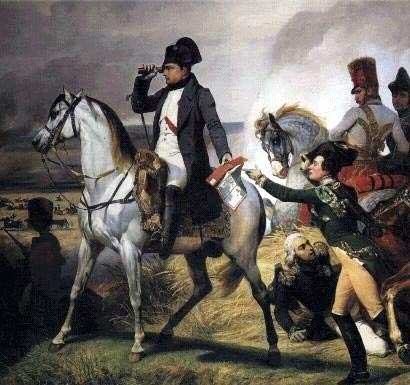 |
Till 1809 he remained without employment, but in that year Napoleon gave him the command of a corps and the duties of military adviser to the young prince Eugène de Beauharnais, viceroy of the kingdom of Italy (Napoleonic). He led the army from Italy till its junction. with Napoleon, and at Wagram commanded the celebrated column of attack which broke the Austrian centre and won the victory. Napoleon made him marshal of France on the field of battle, and presently created him duke of Taranto, which he had created in 1809 a duché grand-fief (a rare, nominal but hereditary honor; extinguished in 1912) -by the French name Tarente- in the Bonapartist kingdom of Naples. In 1810 he served in Spain and in 1812 he commanded the left wing of the grand army for the invasion of Russia. In 1813, after sharing in the battles of Lützen and Bautzen, he was ordered to invade Silesia, where Blücher defeated him with great loss at Katzbach. After the terrible battle of Leipzig, he was ordered with Prince Poniatowski to cover the evacuation of Leipzig; after the blowing up of the bridge, he managed to swim the Elster, while Poniatowski was drowned. |
During the defensive campaign of 1814 Macdonald again distinguished himself; he was one of the marshals sent by Napoleon to take his abdication in favour of his son to Paris. When all were deserting their old master, Macdonald remained faithful to him. He was directed by Napoleon to give in his adherence to the new régime, and was presented by him with the sabre of Murad Bey for his fidelity. |
Under the Bourbons |
At the Restoration he was made a peer of France and knight grand cross of the royal order of St. Louis; he remained faithful to the new order of things during the Hundred Days. In 1815 he became chancellor of the Legion of Honour (a post he held till 1831), in 1816, major-general of the royal bodyguard, and he took a great part in the discussions in the Chambre des Pairs, voting consistently as a moderate Liberal. In 1823 he married Mademoiselle de Bourgony, by whom he had a son, Alexander, who succeeded on his death in 1840 as duke of Taranto. From 1830 his life was spent in retirement at his country place Courcellesle-Roi (Seine et Oise), where he died. |
Summation |
From the Encyclopedia Britannica of 1911 : |
Macdonald had none of that military genius that distinguished Davout, Masséna and Lannes, nor of that military science conspicuous in Marmont and St Cyr, but nevertheless his campaign in Switzerland gives him a rank far superior to such mere generals of division as Oudinot and Dupont. This capacity for independent command made Napoleon, in spite of his defeats at the battle of Trebia (1799) and the battle of Katzbach, trust him with large commands till the end of his career. It has been said that |
"As a man, his character cannot be spoken of too highly; no stain of cruelty or faithlessness rests on him." |
 |
© Paisley Tartan Army 2008-09
